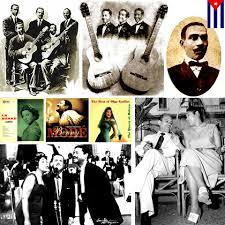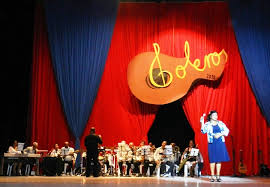 EL “DIVINO” BOLERO, UN GÉNERO MUSICAL NACIDO EN CUBA. SU RADIOGRAFIA.
EL “DIVINO” BOLERO, UN GÉNERO MUSICAL NACIDO EN CUBA. SU RADIOGRAFIA.
El Bolero como género musical nació en la region oriental de Cuba y con el tiempo se ha convertido en uno de los géneros musicales mas escuchados alrededor del mundo. Con una frase de un gran compositor lo describimos hoy, el Divino “Bolero”.
En una sintesis o digamos figuradamente, en una ‘radiografía’ del Bolero, diriamos que este consta de dos partes (A-B), un puente instrumental, y el retorno a la segunda de estas partes. La letra se dosifica en estos dos segmentos. En el primero, a modo de introducción, se expone “el caso” y se perfilan los personajes: el “bueno”, el “malo”. En el segundo segmento se desarrolla la historia, el suceso, hasta arribar a su conclusión, que casi siempre sucederá en el futuro: ya sea ruptura definitiva u ofrenda de adoración imperecedera.
Hay letras de boleros que terminan de manera sorprendente, que contradicen lo dicho en la primera parte, en una especie de giro inesperado como es el caso de “Porque me siento triste”, de María Teresa Vera, compuesto en 1935 que concluye tras referir un estado de hondo abatimiento que provoca la nostalgia de su profundo amor:
¡Oh Dios, omnipotente, apiádate de mí!
Arranca de mi pecho mi amor desesperado
o avívale la llama, para que vuelva a mí.
Y no solo hay un perdón implícito a la culpa del ser amado que abandonó al protagonista-narrador, sino que implica al mismísimo Sumo Creador en la cuita amorosa, sugiriéndole las dos posibilidades únicas que han de provocarle “alivio a su dolor”, y ambas, por cierto, extremas.
https://youtu.be/9vWIY3wBWRo
(Presione ^ Aqui)
.. Más de treinta años más tarde, José Antonio Méndez, en “La gloria eres tú” —bolero de felicidad— escribió esta apasionada estrofa para cerrar la pieza:
Dios dice que la gloria está en el cielo,
que es de los mortales el consuelo al morir.
Desmiento a Dios porque al tenerte yo en vida
no necesito ir al cielo tisú,
si alma mía, la gloria eres tú.
http://youtu.be/EoBNPf_EK3I
(Presione ^ Aqui)
Roberto Espí con su conjunto Casino en 1950 desafió leyes de la Tierra y el Cielo con un amor más fuerte que yo, que mi vida, mi credo y mi sino en el bolero de Francini-Pontier-Bahr titulado “Pecado”: “Porque a veces de tanto quererte me olvido de Dios”.
Rafael Hernández, en “Diez años”, nombró al Creador como único testigo de un romance que a la larga, fracasó, aunque al parecer, de dulce manera:
El sueño venció tus ojos, cerró los míos.
Yo sentí que tu boca linda me murmuró
“abrázame, por tu madre que siento frío”
y el resto de este romance lo sabe Dios.
Roberto Cantoral en “El milagro” se erigió en instrumento de la Providencia —”Dios quiso terminar con tu calvario/ por eso yo he venido a redimirte”—. Pepé Delgado llegó a nombrar al Señor único garante de sus “Cosas del alma” —”Dios solo sabe que en mis sentimientos/ hay cosas del alma de mí para ti”—, y en situación de incertidumbre René Touzet llega a sospechar que sus antiguas inconstancias sentimentales recibían Superior escarmiento:
…será que esto que por ti siento
ha de ser un eterno tormento
con el cual quiera Dios de una vez
castigarme por todas mis locuras
de amor.
http://youtu.be/Dutvyjfz1Pk
(Presione ^ Aqui)
El último bolero que grabó Benny Moré se llamó precisamente “Mi amor, mi fe, mi ilusión”, triada de cuanto aspira el enamorado en el cosmos sentimental que se hace más estrecho cada vez cuanto se siente apeligrado por la ausencia o negación del amor.
Antes, en un bolero de su autoría, “Amor sin fe”, Benny le inquiere a la mujer que regresa a implorar que le perdone: “¿Y de qué te sirve ya mi amor sin fe?”; y otra pérdida de crédito en la persona amada la recoge uno de los llamados cuatro grandes de la Trova Cubana, Alberto Villalón, en “La fe”: “Como se pierde por el espacio el humo,/ así he perdido de tu amor la fe”.
http://youtu.be/LIyXMbNb0Jw
(Presione ^ Aqui)
Luis Demetrio en “Eres todo para mí” —cantado, desde luego, por Olga Guillot— llega a hacerle a la persona amada esta declaración más bien descomunal: “muchas veces pienso en la locura/ que si no hubiera Dios, mi Dios tú fueras”.
En “Sabrá Dios” Álvaro Carrillo admite la existencia de un secreto que supera las posibilidades cognoscitivas de un pobre mortal: “Sabrá Dios si tú me quieres o me engañas”. Cantoral, en “Demasiado tarde”, concluye amargamente la crónica de un desencuentro sucedido en una noche larga, interminable: “lo poco que nos queda de ternura/ que lo reciba Dios entre sus brazos”.
http://youtu.be/OPQc-l0zmzw
(Presione ^ Aqui)
Alberto Domínguez, en “Perfidia”, uno de esos boleros que, de seguro, alguien estará cantando ahora mismo en cualquier rincón de la superficie terrestre, atribuyó a cierta fémina la posibilidad de conseguir un Divino Testimonio:
Mujer: si puedes tú con Dios hablar
pregúntale si yo alguna vez
te he dejado de adorar.
http://youtu.be/wzV0I5dAEP8
(Presione ^ Aqui)
Es así en el mundo del bolero.
 THE “DIVINE” BOLERO, A MUSICAL GENRE BORN IN CUBA. ITS RADIOGRAPHY.
THE “DIVINE” BOLERO, A MUSICAL GENRE BORN IN CUBA. ITS RADIOGRAPHY.
The Bolero as a musical genre was born in the eastern region of Cuba more than one hundred years ago and over time it has become one of the most listened-to musical genres around the world. With a phrase from a great composer, we describe it today, the Divine “Bolero”.
In a synthesis or let’s say figuratively, in an ‘X-ray’ of the Bolero, we would say that it consists of two parts (A-B), an instrumental bridge, and then return to the second of these parts. The letter is dosed in these two segments. In the first, by way of introduction, “the case” is exposed and the characters are outlined: the “good”, the “bad”. The second segment unfolds the story, the event until it reaches its conclusion, which will almost always happen in the future: either a definitive breakup or an imperishable worship offering.
There are bolero lyrics that end in a surprising way, which contradict what was said in the first part, in a kind of unexpected twist as in the case of “Because I feel sad”, by María Teresa Vera, composed in 1935 that concludes after
O almighty God, have mercy on me!
Tear my desperate love from my chest
or fan the flame, so that it returns to me.
And not only is there implicit forgiveness of the guilt of the loved one who abandoned the protagonist-narrator, but it also involves the Supreme Creator herself in the love affair, suggesting the two unique possibilities that have to bring “relief to her pain”
.. More than thirty years later, José Antonio Méndez, in “The glory is you” —bolero of happiness— wrote this passionate stanza to close the piece:
God says glory is in heaven
that the consolation of dying is for mortals.
I give up to God because when I have you alive
I don’t need to go to tissue heaven,
yes, my soul, the glory is you.
Roberto Espí with his group Casino in 1950 defied the laws of Earth and Heaven with a love stronger than me than my life, my creed, and my fate in the Francini-Pontier-Bahr bolero entitled “Sin”: “Because a Sometimes from loving you so much I forget God “.
Rafael Hernández, in “Ten Years”, named the Creator as the only witness to a romance that ultimately failed, although apparently in a sweet way:
Sleep conquered your eyes, closed mine.
I felt that your pretty mouth murmured to me
“hug me, for your mother I feel cold”
and the rest of this romance God knows.
Roberto Cantoral in “The miracle” became an instrument of Providence – “God wanted to end your Calvary / that is why I have come to redeem you” -. Pepé Delgado came to name the Lord as the sole guarantor of his “Things of the soul” – “God only knows that in my feelings / there are things of the soul of me for you” – and in a situation of uncertainty, René Touzet comes to suspect that his former sentimental inconstancies received Superior punishment:
… will this be what I feel for you
it must be an eternal torment
with whom God wants at once
punish me for all my crazy things
of love.
The last bolero that Benny Moré recorded was precisely called “My love, my faith, my illusion”, a triad of how much the lover aspires to in the sentimental cosmos that becomes narrower each time he feels threatened by the absence or denial of love.
Earlier, in a bolero of his authorship, “Love without faith”, Benny asks the woman who returns to implore her to forgive him: “And what good is my love without faith?”; and another loss of credit in the loved one is picked up by one of the so-called four greats of the Cuban Trova, Alberto Villalón, in “La Fe”: “As smoke is lost through space, / thus I have lost faith in your love “.
Luis Demetrio in “You are everything to me” —sung, of course, by Olga Guillot— makes this rather enormous statement to the person he loves: “I often think of madness / that if there were no God, my God you would be “.
In “Sabrá Dios” Álvaro Carrillo admits the existence of a secret that exceeds the cognitive possibilities of a poor mortal: “God will know if you love me or cheat on me”. Cantoral, in “Too late”, bitterly concludes the chronicle of a disagreement that happened in a long, interminable night: “what little we have left of tenderness / may God receive him in his arms.”
Alberto Domínguez, in “Perfidia”, one of those boleros that, surely, someone will be singing right now in any corner of the earth’s surface, attributed to a certain female the possibility of obtaining a Divine Testimony:
Woman: if you can talk to God
ask him if I ever
I’ve stopped loving you.
It is like that in the bolero world.
Agencies/ DDC/ Sigfredo Ariel/ Excerpts/ Extractos/ Internet Photos/ YouTube/ Arnoldo Varona/ www.TheCubanHistory.com
THE CUBAN HISTORY, HOLLYWOOD.










